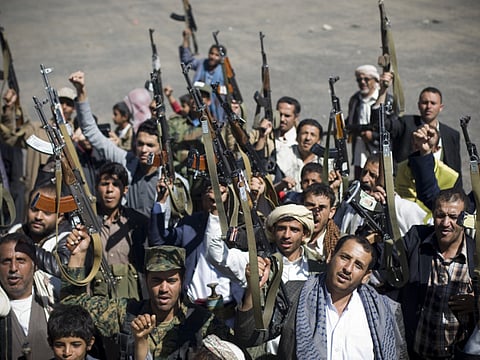Yemen’s Al Houthi rebels take over country
They dissolve parliament and form a five-member presidential council that will replace Hadi

Sana’a: Yemen’s powerful rebels announced on Friday that they have taken over the country and dissolved parliament, a dramatic move that finalises their months-long power grab.
The development also plunges the impoverished country deeper into turmoil and threatens to turn the crisis into a full-blown sectarian conflict, pitting the Iran-backed Al Houthi against tribesmen and secessionists in the south.
It could also play into the hands of Yemen’s Al Qaida branch, the world’s most dangerous offshoot of the terror group, and jeopardise the US counter-terrorism operations in the country.
In a televised announcement from the Republican Palace in the Yemeni capital of Sana’a, the Al Houthi rebels said they are forming a five-member presidential council that will replace President Abd Rabbo Mansour Hadi for an interim two-year period.
The Al Houthis also said that a “Revolutionary Committee” would be in charge of forming a new parliament with 551 members. The committee is the security and intelligence arm of the rebel group, led by Mohammad Ali Al Houthi, relative to the Al Houthis’ leader, Abdul Malek Al Houthi. The statement in Sana’a, read by an unidentified announcer, claimed that it marked “a new era that will take Yemen to safe shores.”
It comes after political parties failed to meet a Al Houthi-imposed deadline on Wednesday to agree on an acceptable way forward.
Al Houthis’ rising dominance — which included a raid of the presidential palace and a siege of Hadi’s residence — forced the president and all Cabinet members to submit their resignations in January.
The announcement did not give a timetable for elections and gave no indication on the fate of the president.
After another round of talks late on Thursday, UN envoy Jamal Bin Omar flew out of the country before the declaration was announced.
Yemen has been riven by instability since the Arab Spring-inspired uprising that forced autocratic president Ali Abdullah Saleh from power in 2012. Saleh has been accused of backing the Al Houthis.
The fall of Hadi’s Western-backed government has raised fears of complete chaos engulfing Yemen, strategically located next to Saudi Arabia and on the key shipping route from the Suez Canal to the Gulf.
Hadi said when he stepped down that he could no longer stay in office as the country was in “total deadlock”.
The former career soldier took office in 2012 under a UN- and Gulf-backed peace plan, in a country awash with weapons and where powerful tribes hold sway, emerging as a consensus figure.
But unlike his predecessor Saleh, who ruled Yemen for 33 years, Hadi had no popular or tribal base to fall back on.
The situation escalated last month when the militia seized a presidential aide in an apparent attempt to extract changes to a draft constitution which they opposed because it would have divided Yemen into six federal regions.
Sign up for the Daily Briefing
Get the latest news and updates straight to your inbox



